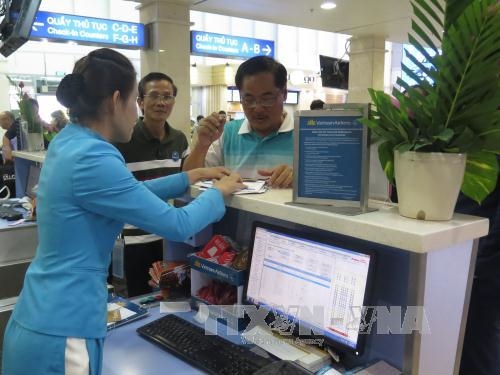 Society
Society

Tân Sơn Nhất International Airport in HCM City has put into use several facilities to improve service quality.
 |
| Passengers check in at Tân Sơn Nhất International Airport in HCM City. The airport has put into use several facilities to improve service quality. — VNA/VNS Photo Hoàng Hải |
HCM CITY — Tân Sơn Nhất International Airport (TIA) in HCM City has put into use several facilities to improve service quality.
Last month it set up 13 check-in kiosks at gates D1 and D2 of the international terminal.
The service, launched after the success of self check-in kiosks at the domestic terminal, helps passengers save time and ease the pressure on staff during peak hours.
The airport has also installed an underground fuel hydrant system for fuelling aircraft, which limits the use of refuelling trucks, reducing risks on the apron.
By the end of this month TIA will begin full operation of its five –floor parking lot with smart technology at the domestic terminal which can accommodate 4,000 motorbikes and more than 1,500 cars. It will also have an area for taxi parking to reduce congestion.
The first phase of expansion of the international terminal is expected to be completed by next month.
The airport has collaborated with the Southern Airports Services Joint Stock Company (SASCO) and other companies to diversify and improve services at the airport, according to a spokesperson.
SASCO is improving the quality of all services, including restaurants and shops.
A chain of convenience stores selling fast foods, drinks and essential items at low prices will open next month.
Next month SASCO will replace two shuttle buses that transport passengers from the gates to the aircraft with COBUS 3000 buses which can carry 110 people.
Also next month SASCO will launch two free services – a 40sq.m children’s play area and a 100sq.m sleeping area with lounge chairs.
In the first half of the year the airport served more than 16 million passengers, up 25.7 per cent year-on-year.
It expects the number to rise to 32 million for the whole year, already much higher than its projected 2020 capacity of 25 million. — VNS




